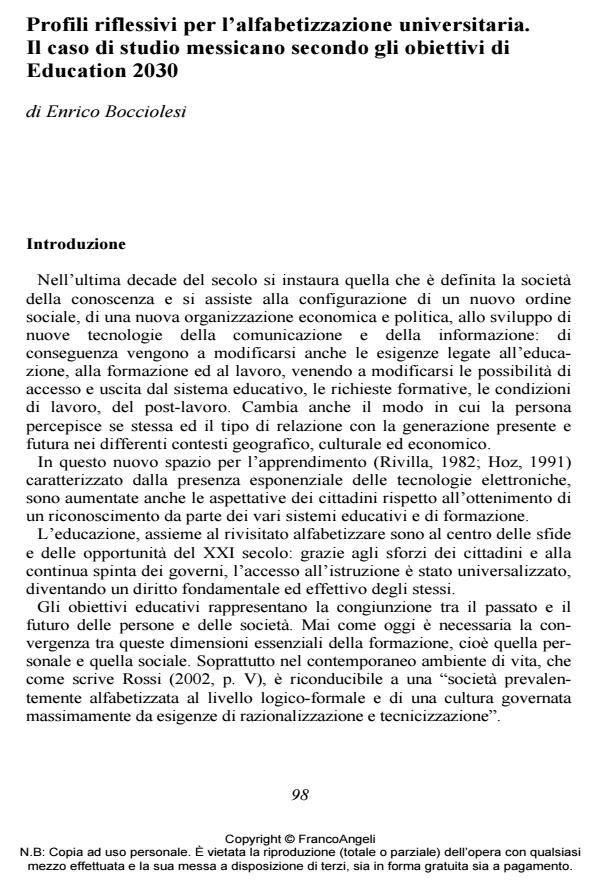Profili riflessivi per l’alfabetizzazione universitaria. Il caso di studio messicano secondo gli obiettivi di Education 2030
Titolo Rivista EDUCATIONAL REFLECTIVE PRACTICES
Autori/Curatori Enrico Bocciolesi
Anno di pubblicazione 2016 Fascicolo 2016/1
Lingua Italiano Numero pagine 18 P. 98-115 Dimensione file 220 KB
DOI 10.3280/ERP2016-001008
Il DOI è il codice a barre della proprietà intellettuale: per saperne di più
clicca qui
Qui sotto puoi vedere in anteprima la prima pagina di questo articolo.
Se questo articolo ti interessa, lo puoi acquistare (e scaricare in formato pdf) seguendo le facili indicazioni per acquistare il download credit. Acquista Download Credits per scaricare questo Articolo in formato PDF

FrancoAngeli è membro della Publishers International Linking Association, Inc (PILA), associazione indipendente e non profit per facilitare (attraverso i servizi tecnologici implementati da CrossRef.org) l’accesso degli studiosi ai contenuti digitali nelle pubblicazioni professionali e scientifiche.
Starting from the Freireian proposal of reading, writing and conscienti¬z¬ation (Freire, 1984) so much of society, how thoughtful act of educating (Hoz, 1991), it was revealed today the need to promote, from reflective practice, continuity and closeness of learning for life (Fabbri, 2008; Rossi, 2008). Many authors refer us to the sense of learning to learn (Heiman, 1985; Alonso, Gallego & Honey, 1994; Johnson, Johnson & Holubec, 1996; Thrun & Pratt, 2012), with particular attention paid to educational sciences and renewed their definitions of literacy. With current and ongoing updates of old and new educational reforms have proved difficult, and demands. Starting from changes in the educational area, typical of recent reforms iberoamerican, through reading the latest indications of UNESCO, the UN and NATO, has decided to activate a route that can integrate learning pragmatism of the social context. These reasons have brought the Universidad de Gudalajara, Mexico, to start a training programme, unique in its kind, aimed at the promotion of new forms of literacy. In an academic setting, where universities, reflexivity and reading skills meet, interesting learning objectives have been achieved, that are proposed in this paper. Methods and narratives aimed at learning have encouraged the spread of critical thinking, working in synergy with the socio-and based on models of reflexivity inherent in learning styles offered by Alonso and Gallego in short form CHAEA (Cuestionario Honey-Alonso Estilos de Aprendizaje).
Enrico Bocciolesi, Profili riflessivi per l’alfabetizzazione universitaria. Il caso di studio messicano secondo gli obiettivi di Education 2030 in "EDUCATIONAL REFLECTIVE PRACTICES" 1/2016, pp 98-115, DOI: 10.3280/ERP2016-001008